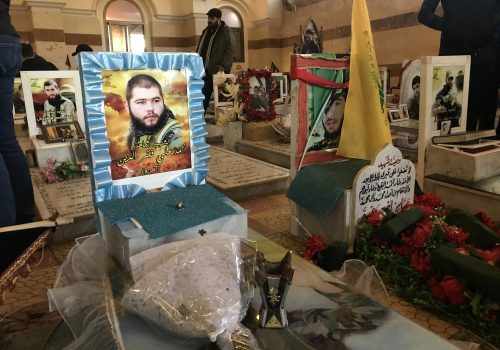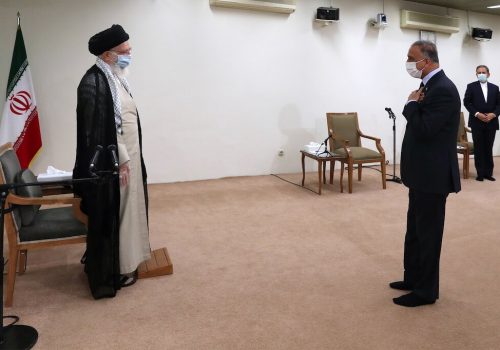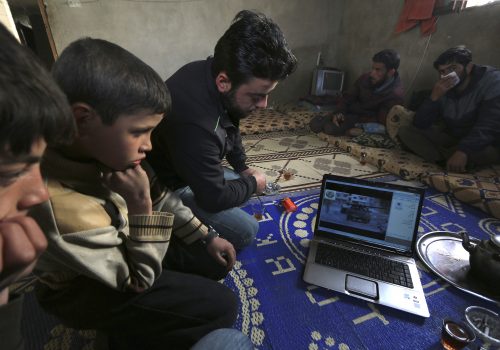Syria’s inconsequential 2021 presidential elections must be ignored
On July 19, Syria held its scheduled parliamentary elections, resulting in a major win for Baathist Party members, militia leaders and their affiliates, and the new business elite. This latest round of legislative elections witnessed low voter turnout (officially, 33 percent of the electorate showed up), outright public objections to the results by defeated candidates, and systematic manipulation of the results. These phenomena constitute worrying indicators of the Bashar al-Assad regime’s plans for the presidential elections next spring.
According to General Elections Law, Syrian presidential elections scheduled to take place between April 16 and May 16—at least ninety days before President Assad’s seven-year term expires.
A new round of United Nation’s (UN) constitutional committee talks are scheduled for August 24 in Geneva. The constitutional committee, one of four elements outlined in UN Security Council Resolution 2254 (the internationally agreed upon political settlement for Syria) is meant to precede free and fair elections, administered and supervised by the United Nations. Although Russia and the Assad regime are reluctantly advancing the process, they have simultaneously signaled that progress on the committee’s work will have no bearing on the 2021 Syrian presidential elections, with a new constitution only to go into effect after the elections.
American and European policymakers are debating their official positions regarding the elections, given that no amount of pressure has weakened the Assad regime. Skepticism on working with Russia within the regime’s framework—rather than the international community’s—abounds. The imposition of Caesar Act sanctions, sporadic protests in Dara’a and Sweida provinces, and the open disagreement between Assad’s wealthy and powerful maternal cousin Rami Makhlouf and former parliamentarian and leading businessman Fares Shehabi have not made the regime more conciliatory. The regime’s uncooperative approach has extended even to an international request to release a portion of the nine thousand juveniles interned in its horrific detention centers.
Thus, at the moment, the international community has three options for handling the upcoming elections.
The first is to ignore them. Some policymakers describe them as a unilateral political action by the regime instead of elections. This is because they fall outside Resolution 2254’s framework, which requires the constitutional committee to approve a draft constitution, followed by a public referendum, to trigger UN-monitored and approved presidential elections.
The second option is for the United States to convince Russia to have Assad step aside by promising to preserve Moscow’s other demands, like their control of all military and security apparatus reforms, which most Russian experts argue is Moscow’s primary concern. Allowing Assad to run in the elections would guarantee his success due to the opposition’s unreadiness (limited political maturity and lack of unity) to compete against him in an open election, which is why this option requires that he not run. Additionally, it also concedes that the constitution and electoral laws remain unchanged. It further posits that electing any new Syrian leader—even one operating under the existing rules—could result in the beginning of the peace process, including the appointment of a transitional governing body that fills crucial governmental posts with regime and opposition figures.
However, irrespective of any Russian desire for flexibility, Iran will likely insist on leadership deferential to its interests, such as the preservation of their land bridge to Lebanon. The examples of Iraq and Lebanon display the extent to which Tehran will exert influence on foreign leadership to preserve its interests, even if it comes at the host country’s expense.
The final option requires drafting an interim constitution—or basic constitutional principles—and enforcing complete UN control over the elections. This depends on the US and other opposition allies running a sufficiently strong candidate who, under favorable conditions of free and fair elections, can oust Assad from office. However, this rests on the untested assumption that such elections could take place under the watchful eye of Assad and his omnipresent security apparatus.
With the erosion of Assad’s legitimacy, there is little way to stabilize Syria so long as he remains in power. His security state continues to terrorize Syrians inside the country and refugees attempting to return home. This terror directly contributes to the ongoing brain drain, exacerbating Syria’s current economic downturn. The regime applies laws capriciously and arbitrarily at the expense of stability, including the use of zoning laws to confiscate dissidents’ property or to re-imprison “reconciled” former fighters. The grievances these actions are causing have the potential to reignite the country’s internecine violence.
Assuming the status quo continues, the 2021 presidential elections must be ignored. Otherwise, Russia has two options: either convince Assad to withdraw his candidacy or gamble on him running again, but against a US and European-backed opposition candidate and a UN election mandate. Regardless of the outcome, Russia and the United States will still have to contend with Iranian influence and its far more substantial ground presence in Syria.
Jomana Qaddour is a nonresident senior fellow at the Atlantic Council. Follower her on Twitter: @jomanaqaddour.
Danny al-Baaj is a former Syrian diplomat and co-founder of MGAL Consulting. Follow him on Twitter: @d_baaj.
Subscribe for more from MENASource
Sign up for the MENASource newsletter, highlighting pieces that follow democratic transitions and economic changes throughout the region.
Image: Syrian President Bashar al-Assad addresses the government committee that oversees measures to curb the spread of the coronavirus disease (COVID-19), in Damascus, Syria on May 4, 2020 via REUTERS.


